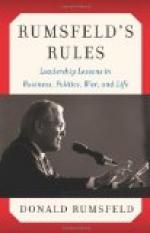There must be some way in which a national affair of such importance can be properly managed, and just now it might be well to consider how a nation can manage a war. Certainly not by the methods of political decision to which recent developments of democracy have accustomed us. You cannot fight a campaign by consulting the constituencies or even the House of Commons before deciding whether a general shall move to his right or his left, shall advance or retire, shall seek or shall avoid a battle. Neither can you settle by popular vote whether you will make guns of wire or of fluid compressed steel, what formations your infantry shall adopt, whether the soldier is to give six hours a week to shooting and one to drill, or six to drill and one to shooting.
Yet all these questions and many others must be settled, some during peace and some during war, and they must be settled correctly or else there will be defeat. In political matters the accepted test of what is correct is the opinion of the majority as expressed by votes in a general election, but in war the test of what is correct is the result produced upon the enemy. If his guns out-range yours, if his troops at the point of collision defeat yours, there has been some error in the preparation or in the direction, unless indeed the enemy is a State so much stronger than your own that it was folly to go to war at all, and in that case there must have been an error of policy. The decisions upon which successful war depends turn upon matters which have no relation to the wishes or feelings of the majority; matters not of opinion but of fact; matters about which eloquence is no guide, and in regard to which the truth cannot be ascertained from the ballot box, but only by the hard labour of prolonged study after previous training. For success in war depends upon the troops being armed with the best weapons of the day, upon their being trained to use them in the most appropriate manner, upon the amount of knowledge and practice possessed by the generals; upon a correct estimate of the enemy’s forces, of their armament and tactics, and upon a true insight into the policy of the Powers with which quarrels are possible.
A year ago it was known to many persons in this country, and the Government was informed by those whose, special duty it was to give the information, that the Boer States aimed at supremacy in South Africa, that they were heavily armed, that a large force would be required to defeat them, and that to postpone the quarrel would make the inevitable war still more difficult. It was well understood also that the difficulty lay in the probability that if a small force were sent it would be exposed to defeat, while if a large one were sent its despatch would precipitate the war. These were the facts known more than a year ago to those who wanted to know. Is it not clear that the Government’s management has been based upon something other than the facts; that the Government




